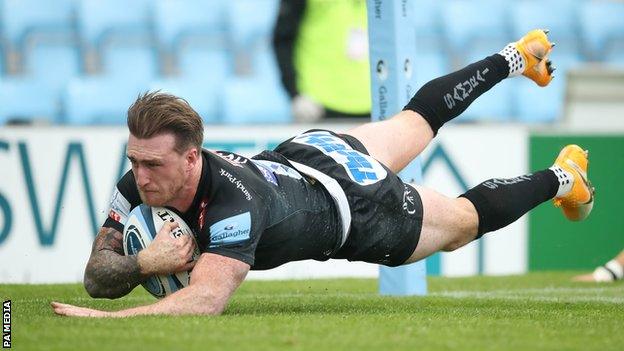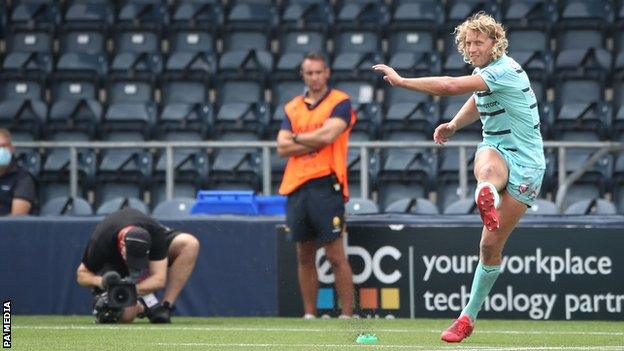Premiership: What we learned from 2019-20 season resumption
- Published

Scotland full-back Stuart Hogg scored on his return to Premiership action for leaders Exeter Chiefs
The 2019-2020 Premiership season made its long-awaited return on Friday after a break of 159 days.
With no supporters present and strict coronavirus regulations in place, it was a step into the unknown for players, coaches and officials.
But was it worth the wait?
'Fantastic but horrible'
How did the players and coaches find the atmosphere without supporters?
"Personally I found it horrible, I don't mind telling you," a candid Exeter director of rugby Rob Baxter told BBC Radio 5 Live following his side's 26-13 win over Leicester.
"It was great to watch the lads play a game of rugby, and it was fantastic to get the sport back on TV, but did it feel like a great day at Sandy Park? Not really.
"We need to hurry up and start getting trial events in place and start getting crowds in here, in the correct way."
Baxter's view was echoed by Sale boss Steve Diamond, while for the players, such as Harlequins wing Chris Ashton, it was about generating their own energy - something Quins did to good effect in their gutsy win over the misfiring Sharks.
"It was really weird - especially for me - I want the crowd because I play for them," Ashton explained.
"You very much have to create your own energy and atmosphere within the team which we did.
"I think the weirdest bit for me was not getting abused by the crowd. I really enjoy getting abuse so I actually missed it!"
Home advantage?
The swathes of empty seats at The Stoop, The Rec, Sandy Park, Ashton Gate, Sixways and Franklin's Gardens were a constant reminder of the surreal nature of the current sporting environment.
But were the empty stadia something of a leveller, as has been the case across some football leagues?

Gloucester were one of the two clubs to win away from home in the first round of fixtures after the restart
Four wins out of six for the hosts this weekend suggests familiarity and home comforts will still be significant, even without the vociferous backing of thousands of supporters.
Diamond admitted his side were "still on the coach" after they failed to fire a shot at The Stoop - the long journey down from the north-west possibly taking a toll - adding mischievously that Quins still benefited from the rub of the green after Sale were whistled off the park.
However, Gloucester and Wasps both won well on the road, with the latter's bonus point victory at Northampton especially impressive in what was the game of the weekend.
"Normally [Franklin's Gardens] is a great place to play and the fans are amazing, but we didn't have that extra boost," said Saints scrum-half Alex Mitchell.
"It's still nice playing here, but echoey... and different."
Too much whistle?
With officials worldwide looking to tidy up the breakdown, a long-standing area of concern for the game, a high penalty count was inevitable.
The games at Harlequins, Exeter and Bristol especially were punctuated by the referee's whistle as players struggled to adapt to new interpretations, leading to a few disjointed spectacles.
"I think the referees have wanted to make a mark, and we have to work with them," said Diamond.
New Leicester head coach Steve Borthwick also refused to complain after his side haemorrhaged penalties - 22 in all - in their defeat at Sandy Park, putting it down to some "over-zealous" players keen to impress, while Quins head of rugby Paul Gustard said preparing for the tweak in the officiating was a major focus of the lockdown.
"We've had four referees in [to training] over the past two weeks," he said.
But while players will have suffered both physically and technically from a lack of pre-season games, it is also the same for the officials.
"Don't forget the referees are no different to us; they are getting back to refereeing regularly. This is very much their 'pre-season' as well," added Baxter.
"There is a slight change in the interpretation of things, and they are going to take a while to adapt to that as well.
"But the majority of penalties Leicester gave away were penalties last year, the year before, and the year before that."
England and Lions legend Jeremy Guscott believes the onus is on players, not referees, when it comes to reducing the penalty count.
"I'm all for this, I love the laws being applied appropriately and properly," Guscott said as he commentated on Exeter v Leicester for Radio 5 Live.
"The players just have to adjust. If they don't, they're going to get blown off the park."
The final game of the weekend - Northampton v Wasps - saw a cleaner battle at the breakdown and only 16 penalties in total, an encouraging sign that players and coaches will be able to learn and adapt quickly.
Did superstar signings fire?

Manu Tuilagi's Sale debut ended in defeat at Harlequins on Friday
With players' contracts still running from July to June, a flood of players moved clubs in the lockdown even though the season is still some way from completion.
Ben Spencer and Jonny Gray were among the big-name signings to enjoy winning starts to their spells at Bath and Exeter respectively, but Manu Tuilagi - a bumper addition to the Sale squad after his acrimonious departure from Leicester - was starved of ball on his debut.
Fiji superstar Semi Radradra, perhaps the biggest acquisition of them all, also endured a frustrating debut, albeit in a winning cause for Bristol against Saracens.
"It wasn't the conditions for Semi but just having him out there gives the boys confidence," said Bears boss Pat Lam.
Ashton, who wreaked havoc for Toulon alongside Radradra in 2017-18, added: "I think coming into this league will be a shock to him having played in France for the past few years.
"You're playing in the sun most of the time and a lot of the teams love to play with ball in hand. To see so many kicks will take some getting used to.
"And when you go to a new club it takes time to build relationships and partnerships and to understand how your team-mates move.
"It might take some time for him to adjust, the Premiership is very different tactically but hopefully he will cotton on pretty quick."
Return 'something to be cherished'
Teething problems are likely to persist as players and coaches deal with rustiness, the alien experience of empty stadia, and the officiousness of the referees.
But with clubs attempting to clamber out of a financial black hole, and after five months without action, the fact rugby union is finally back up and running - regardless of the guise - is something to be cherished.